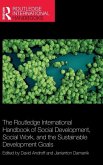Developing countries may not have full-fledged welfare states like those we find in Europe, but certainly they have welfare state systems. For comparative social policy research, the term "welfare state systems" has many advantages, as there are numerous different types/models of welfare state systems around the world.
This revised and expanded second edition brings together leading experts to discuss social policy in 32 countries/regions around the world: from the most advanced welfare state systems in Scandinavia and Western Central Europe to the developing powers of Brazil, China, India, Indonesia, Mexico, and Russia.
Country-specific chapters provide in general a historical overview, discuss major characteristics of the welfare state system, and analyze country-specific problems, as well as critical current and future trends for further discussions, while also providing one (additional) major focal point/issue for greater in-depth analysis.
Including new country case studies on Mali, South Africa, Iceland, Spain, Italy, Greece, and Vietnam, this book is reframed around urgent contemporary issues including migration and rising social inequalities, LGBTQIA+ rights, universal basic income, and transboundary social policy.
It will be of great interest to all scholars and students of social policy, social development, development economists and health economists, experts in public policy, health policy (including mental health policy), housing policy, education policy, family policy, cis- and trans-gender policy, migration and population policy, sociology, social work, anthropology, as well as social policy and public policy makers and administrators.
This revised and expanded second edition brings together leading experts to discuss social policy in 32 countries/regions around the world: from the most advanced welfare state systems in Scandinavia and Western Central Europe to the developing powers of Brazil, China, India, Indonesia, Mexico, and Russia.
Country-specific chapters provide in general a historical overview, discuss major characteristics of the welfare state system, and analyze country-specific problems, as well as critical current and future trends for further discussions, while also providing one (additional) major focal point/issue for greater in-depth analysis.
Including new country case studies on Mali, South Africa, Iceland, Spain, Italy, Greece, and Vietnam, this book is reframed around urgent contemporary issues including migration and rising social inequalities, LGBTQIA+ rights, universal basic income, and transboundary social policy.
It will be of great interest to all scholars and students of social policy, social development, development economists and health economists, experts in public policy, health policy (including mental health policy), housing policy, education policy, family policy, cis- and trans-gender policy, migration and population policy, sociology, social work, anthropology, as well as social policy and public policy makers and administrators.
In light of, and being complementary to, the recently published book Ten Worlds of Welfare Capitalism, Aspalter and his authors provide a strong in-depth analysis of 32 welfare state systems across the entire world, also within the framework of the descriptive Ten Worlds Theory and the normative Developmental Social Policy Theory. His collected expert chapters encompass Australia, the United States, Latin America, Africa, the Middle East, Europe, North Asia, South Asia and East Asia, literally all continents and most corners of the world. Despite the great number of welfare regimes covered, welfare state systems across the nations presented are fully and deeply analyzed in all their complexities and diversities, covering a most-extensive range of social policy sub-fields, topics and issues. With this new and extended Second Edition of this Handbook, Aspalter and his colleagues have reached a new milestone in light of comparative social policy studies.
Wan-I Lin
Minister without Portfolio, Executive Yuan (Taiwan), Emeritus Professor, Department of Social Work, National Taiwan University, Taipei, Taiwan
Wan-I Lin
Minister without Portfolio, Executive Yuan (Taiwan), Emeritus Professor, Department of Social Work, National Taiwan University, Taipei, Taiwan








